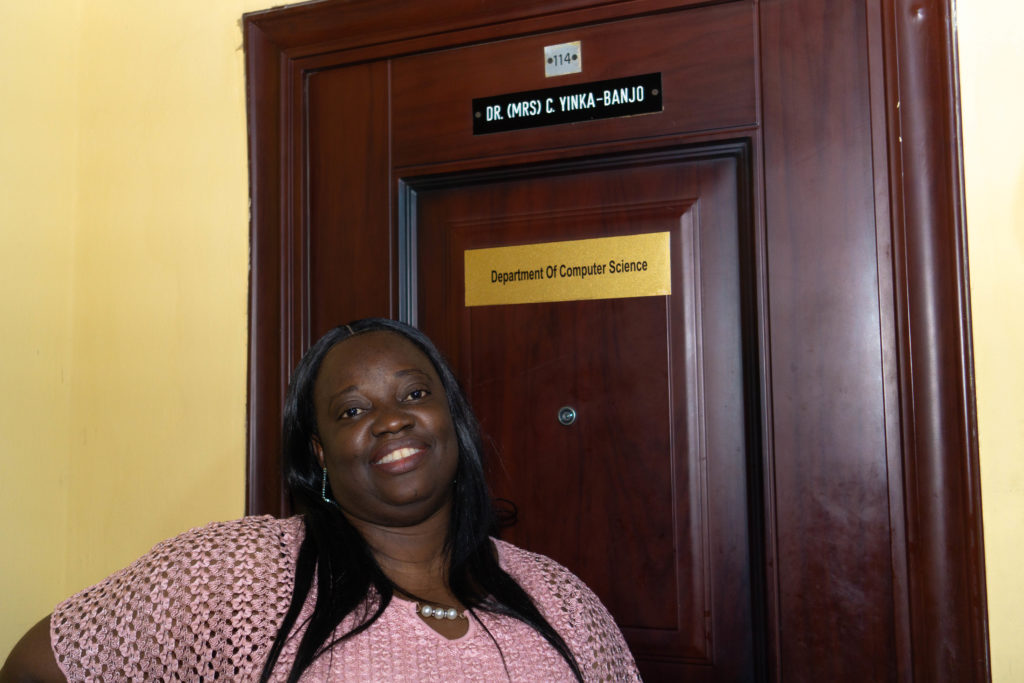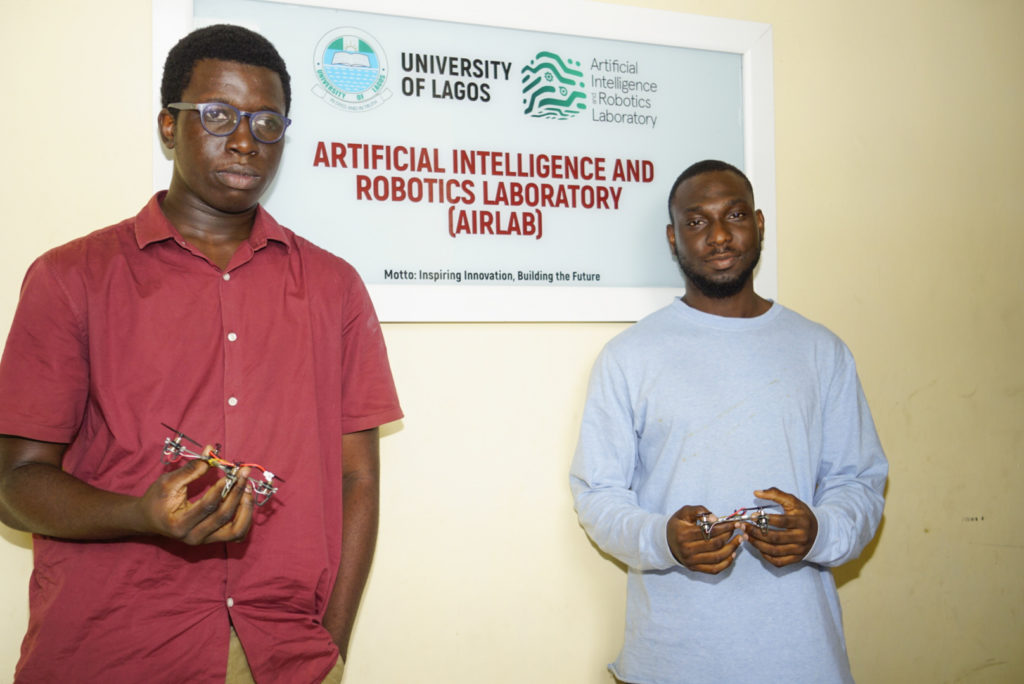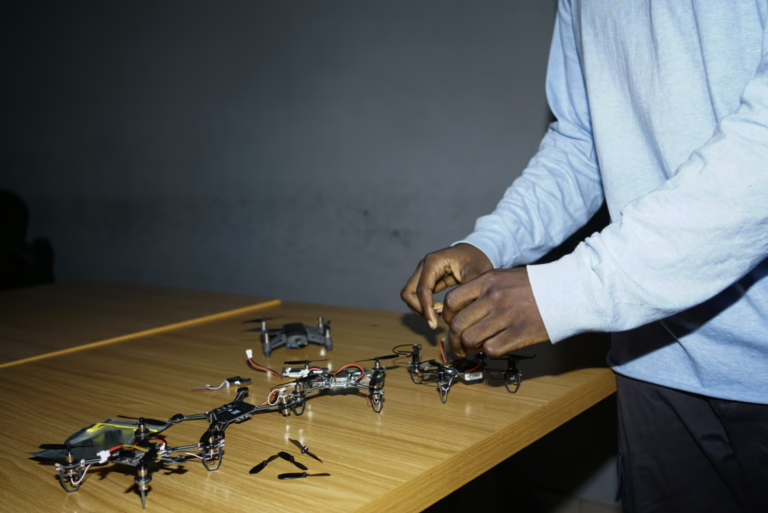Every Thursday, Delve Into AI offers in-depth perspectives on Africa’s evolving artificial intelligence landscape. This series explores the interplay between AI and the continent’s culture, policy frameworks, and business ecosystems. Stay informed about the innovators, initiatives, and challenges shaping Africa’s AI future. Share your feedback on this column via this form.
From Academic Foundations to AI Innovation Leadership
Dr. Chika Yinka-Banjo’s journey into artificial intelligence and robotics research was not preordained. Since 2018, she has led the Artificial Intelligence and Robotics Research Lab at the University of Lagos, nurturing innovation and development in these cutting-edge fields. Her academic path began with a bachelor’s degree in mathematics and computer science from the Federal University of Technology, Owerri, in 1999. Seeking a more hands-on experience beyond the theoretical focus of her first degree, she pursued a master’s in computer science at the University of Port Harcourt.
“Initially, computer science was very abstract-studying concepts without direct interaction with computers-but my passion for the field kept me engaged,” she reflects.
Unfulfilled by her first graduate program, Dr. Yinka-Banjo earned a fully funded scholarship to the African Institute for Mathematical Sciences (AIMS) in South Africa, where she completed a second master’s in mathematical sciences. She then obtained her Ph.D. in computer science from Stellenbosch University in 2015, one of South Africa’s premier institutions, before returning to Nigeria with a commitment to empower the next generation of researchers.

Photo Credit: Maryam Shittu/Big Cabal Media
Building AIRLAB: A Hub for AI and Robotics Research
With financial support from Canada’s International Development Research Centre (IDRC), Dr. Yinka-Banjo established AIRLAB within the University of Lagos’ Computer Science Department. Initially operating from a modest office, the lab has since expanded into the Central Research Laboratory, aspiring to become a globally recognized center for AI and robotics research and development.
Since its inception, AIRLAB has actively engaged students in competitive robotics events such as the First Tech Challenge, earning accolades along the way. The lab also runs complimentary summer workshops aimed at equipping teenagers with foundational skills in AI and robotics.
In July 2025, supported by the Massachusetts Institute of Technology (MIT), AIRLAB hosted the Lagos edition of NaijaCoder, an intensive coding bootcamp for secondary school students.
“Our goal extends beyond training future software engineers,” explains Victory Yinka-Banjo, a recent MIT graduate and program coordinator. “The competencies students acquire here are essential for research, scientific inquiry, and computational thinking-critical pillars for AI development today.”
Challenges in Funding and Research Focus
While AIRLAB excels in youth engagement, Dr. Yinka-Banjo emphasizes the urgent need to pivot towards applied research that addresses Nigeria’s and Africa’s unique challenges. However, securing funding for such research remains difficult. Most grants tend to favor extracurricular programs targeting younger demographics.
“Despite numerous proposals, funding consistently favors initiatives involving children,” she notes. “Yet, investment in research is vital for creating AI solutions tailored to local contexts and for positioning Africa as a global AI leader.”
Government support is minimal, with budget constraints cited as a barrier. “We rely heavily on external funding sources to sustain our work,” she adds.
In the second quarter of 2025, AIRLAB secured grants from the IDRC and the UK Foreign, Commonwealth & Development Office to launch a project developing AI-powered educational assistants designed for low-connectivity and underserved learning environments across Africa.
Previous research endeavors at AIRLAB, focusing on AI applications in agriculture and healthcare, have also depended on international sponsorship. This external backing is crucial for attracting and retaining talent, a persistent challenge given the brain drain of skilled researchers seeking opportunities abroad.
For instance, Nigerian student applications to Canadian universities surged to approximately 46,000 in 2023-a 260% increase since 2021-highlighting the growing trend of academic migration.
“The recognition of Nigerian intellect is encouraging,” Dr. Yinka-Banjo remarks. “Our strategy now includes aggressively pursuing research grants to retain talent.”
Emerging Talent Committed to Local Impact
One promising researcher is Mariam Muhammed, who joined AIRLAB as a Ph.D. candidate on the AI for Education initiative after completing her master’s in computer science at the University of Lagos in 2024.
“I was exploring opportunities abroad but stopped when I discovered this project-it perfectly aligns with my aspirations,” she shares.
Muhammed’s background includes an undergraduate degree in electrical engineering and a postgraduate diploma in education. She has industry experience developing AI-driven personalized learning software for international startups targeting markets like the United States. Now, she is focused on creating AI solutions that resonate with Nigerian and African realities.
The project’s external funding provides a structured research environment with accountability mechanisms uncommon in many Nigerian Ph.D. programs.
“Funded Ph.D. opportunities are scarce in Nigeria compared to developed countries,” she observes. AIRLAB also supports undergraduate students eager to explore AI and robotics through personal projects.

Photo Credit: Maryam Shittu/Big Cabal Media
Hands-On Learning Beyond the Classroom
Owolala Olaoluwasubomi, a fourth-year mechanical engineering student at UNILAG, began a six-month industrial internship at AIRLAB in April 2025.
“I wanted more than just a job-I sought a place to grow and learn,” he explains. “At AIRLAB, I’m developing skills beyond traditional coursework.”
His internship will culminate in a project to design a remotely controlled robotic arm. Olaoluwasubomi aspires to pursue graduate studies abroad to deepen his research expertise.
“Nigeria’s robotics and AI research scene is still emerging,” he notes. “Opportunities here are limited compared to more technologically advanced countries.”
Future Outlook: Bridging the Gap in African AI Research
Despite the dedication of researchers like Dr. Yinka-Banjo, Nigerian AI initiatives face significant hurdles due to limited governmental investment. This contrasts sharply with countries like Egypt, which has positioned itself as a regional AI research hub. Egypt’s 2025-2030 AI strategy aims to boost annual AI publications to 6,000, contributing to its universities’ dominance in African AI rankings. South Africa also leads with six universities in the continent’s top ten AI research institutions. Nigeria’s highest-ranked university, the University of Ibadan, stands at 50th, while UNILAG ranks 74th.
These investments correlate with substantial funding rounds for AI startups in Egypt and South Africa, underscoring the link between research infrastructure and entrepreneurial success.
Nevertheless, AIRLAB’s research, though constrained, holds the potential to significantly influence Africa’s AI ecosystem.
“Researchers trained in these labs often become entrepreneurs who translate their innovations into market-ready products,” says AI policy expert Victor Famubode.
We invite you to share your thoughts on this column and suggest topics related to AI in Africa for future exploration. Please fill out the feedback form.
Save the date! Moonshot by TechCabal returns to Lagos on October 15-16, 2025. Join Africa’s leading founders, creatives, and tech visionaries for two days of inspiring keynotes, networking, and forward-thinking discussions. Early bird tickets are now available at 20% off-don’t miss out! Visit moonshot.techcabal.com.





















0 Comments